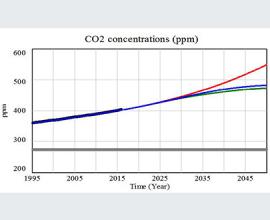Jaime Nieto, Óscar Carpintero and Luis J. Miguel, MEDEAS partners from the University of Valladolid have just published a scientific article in Ecological Economics, entitled: “Less than 2 °C? An Economic-Environmental Evaluation of the Paris Agreement”.
The literature dedicated to the analysis of the different climate agreements has usually focused on the effectiveness of the aims for emissions in the light of the advance in climate change. The article quantifies the variation in emissions that the Intended Nationally Determined Contributions (INDCs) will entail and their financial allocation and policies country-by-country and regionally. The objective is evaluating the Paris Agreement feasibility regarding the INDCs and its economic and environmental constraints. The criteria through which the 161 INDCs are analysed are as follows: i/ socio-economic impact of the transition; ii/ focus on energy management; iii/ substitution of non-renewable sources; iv/ the role of technology; v/ equality of the transition; vi/ compliance with emission reductions. The results obtained show that the Paris Agreement excessively relies on external financial support (41.4%). Moreover, its unilateralist approach, the socio-economic and biophysical constraints could be the underlying cause of the ineffectiveness of the 2 °C objective. This way, each country would emit an average of 37.8% more than in the years 2005–2015. When this is weighted, the figure would be a 19.3% increase, due mainly to the increases in China and India. These figures would lead the temperatures up to 3°–4 °C.
The complete article can be found here.

